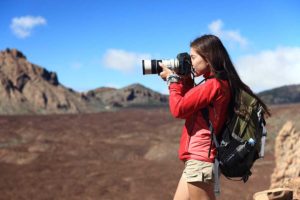Disclaimer: The information on our website is provided for general information purposes only. We make no representations or warranties of any kind, express or implied, about the completeness, accuracy, reliability, suitability or availability with respect to the website or the information contained on our website for any purpose. Any reliance on such information is therefore strictly at your own risk and we are not liable for any damages or losses arising out of or resulting from your reliance on any information contained on our website.
A photographer captures images electronically, normally using a digital camera, and editing photos on a computer. They provide a wide variety of photographic services, depending on their expertise, such as portraits, event photography (such as weddings), magazine covers, landscapes, medical data, or for journalist events. They may create photographic artwork or even work for academic institutions.
Watch a video to learn what a photographer does:
How to Become a Photographer

A portrait photographer does not require formal education after high school but you can take photography classes to grow your skill. It’s important to match technical knowledge of photography with creativity to gain a competitive edge. If you want to become an industrial photographer, scientific photographer, or photojournalist, a bachelor’s degree is usually expected. Several universities, state, and community colleges offer photography classes, so do vocational and technical colleges.
Many photographers are also self-employed and own their own photography business. Whether working for an employer or self-employed with your own photography business, developing a portfolio of your work is crucial to gain employment or clients.
Job Description of a Photographer
A photographer’s work can be very technical, using equipment like computers, editing software, and high-quality printers, which helps them edit, crop, enhance, or modify an image. They test the best lighting (natural and artificial) when taking photographs and enhance the images through color correction or other special effects.
Photographers remain competitive through providing digital portfolios to show their work, usually on a website, and attract clients by advertising services and marketing strategies. A photographer should be artistic and interpersonal and be skilled in customer service, business and computers and be detail oriented. A photographer may work for a university, newspaper, or other places that his or her specialized photographic skills are needed, or be self-employed.
Photographer Career Video Transcript
Today, a camera in your pocket is the norm but it takes a skilled photographer with technical knowledge and artistic vision to capture poetry in a visual image. These professional artists use technical equipment and software to create quality photographs. Expertise with digital cameras and photo editing software is a must whether they shoot weddings, portraits, or breaking news stories.
About 60% of photographers are self-employed. These photographers often need to advertise and attract new clients. This makes networking and maintaining an online portfolio essential for marketing their work. Independent photographers are also responsible for record keeping as well as purchasing and maintaining equipment. Photographers work in news, portrait studios, and commercial studios. They may specialize, for example, in scientific, aerial, or industrial photography. Working for a news outlet can mean long and irregular hours, exposure to dangerous surroundings, and frequent travel.
Most photographers stand or walk for long periods while carrying heavy equipment. Many positions require only the skill and expertise needed to capture the images an employer wants. Although a bachelor’s degree in photography or a related field may be required for work in photojournalism or specialized fields. While a career in photography takes commitment to the craft and artistic discipline, it’s worth it to get the perfect shot.
Article Citations
Bureau of Labor Statistics, U.S. Department of Labor, Occupational Outlook Handbook, Photographers.
The career video is Public Domain from the U. S. Department of Labor, Employment and Training Administration.

